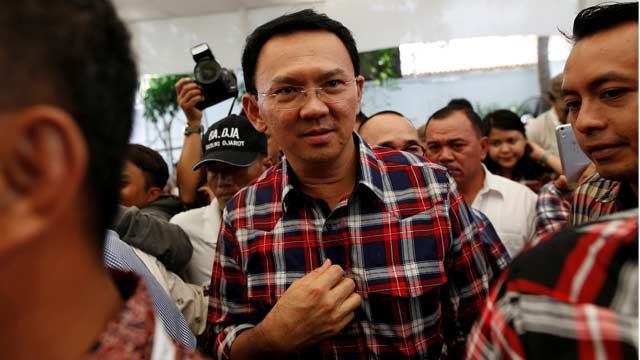
The trial of Basuki "Ahok" Tjahaja Purnama, Jakarta's first ethnic Chinese and Christian leader and an ally of President Joko Widodo, has raised questions about the role of religion in politics in the world's biggest Muslim-majority nation.
Purnama has been allowed to campaign in the election despite his trial and prosecutors had been expected on Tuesday to call for him to be jailed on a charge of insulting Islam. Instead, judges agreed to a request by prosecutors to postpone the hearing for April 20, a day after the election for city governor.
Why is Jakarta's governor on trial for blasphemy?
Police had also written to prosecutors to ask for a delay over security concerns. "We think the police letter can be taken into consideration due to the matter of security," prosecutor Ali Mukartono told the court, referring to the timing of the next hearing.
The prosecution's main reason in asking for a delay was to have more time to prepare, he said.
City police last week called for the trial to be delayed until after vote because of worries that religious and ethnic tensions in the city of more than 10 million people were running high. Purnama went on trial late last year after some Muslim groups objected to comments he made about his opponents' use of the Holy Quran in campaigning.
Since then, hundreds of thousands of Muslims, led by hardline groups, have taken to the streets to call for Purnama to be sacked, and to urge voters not to elect a non-Muslim. Some anti-Purnama protesters said they were disappointed with the delay. "This hearing was delayed deliberately until after the election ... The election, a political factor, is affecting this legal process," said Pedri Kasman, a member of the moderate Islamic group, Muhammadiyah.
Tearful Jakarta governor denies insulting Quran in blasphemy trial
Muslims make up nearly 90 percent of Indonesia's 250 million people but there are sizeable communities of Buddhists, Hindus, Christians and people who adhere to traditional beliefs. The state ideology, Pancasila, enshrines religious diversity in an officially secular system.
Purnama has apologised for his comments and denied any wrongdoing. He faces up to four years in prison if found guilty. Despite his trial, Purnama enjoys strong public support because of his efforts to ease Jakarta's chronic traffic congestion and flooding.
1732503274-0/Untitled-design-(43)1732503274-0-405x300.webp)
1732501636-0/Untitled-design-(42)1732501636-0-165x106.webp)

1732498967-0/Outer-Banks--(1)1732498967-0-165x106.webp)
1732086766-0/BeFunky-collage-(74)1732086766-0-165x106.webp)












COMMENTS
Comments are moderated and generally will be posted if they are on-topic and not abusive.
For more information, please see our Comments FAQ